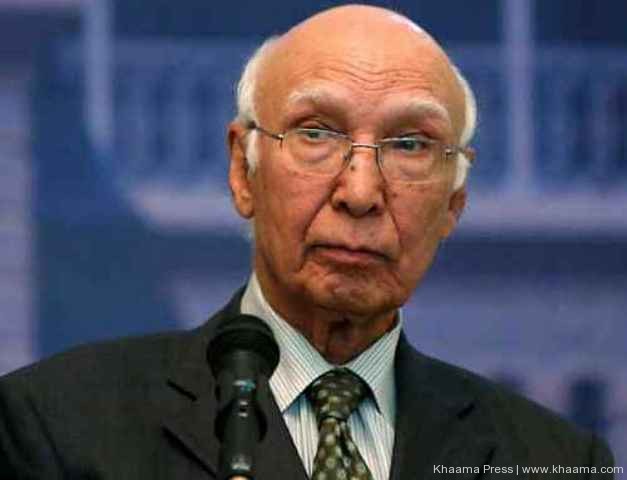WASHINGTON, (APP): Adviser to the Prime Minister on Foreign
Affairs Sartaj Aziz said that Pakistan should not be blamed for the problems in Afghanistan and hoped direct talks between the Taliban and Afghan officials expected in two weeks would help strength efforts for peace in that country.
Speaking at an event organised by the Council on Foreign Relations in
Washington, Aziz said there was still a misperception that Pakistan was supporting some groups and there were still people who sympathize with Taliban.
“This perception needs to be corrected because the way we have carried
out process in the last two years, the starting point of that is very clear that unless peace comes to Afghanistan, Pakistan will not become peaceful,” he said adding that restoring peace in Afghanistan is as important for as it was for the Afghans.
“That requires that there should be a political consensus between the
Taliban and Afghan government and not the other way round,” he added.
He recalled that when Afghan President Ashraf Ghani visited Pakistan in
November, two months after taking over, there was a very strong feeling of achieving the right relationship and the two sides had good arrangements to start the reconciliation process.
But, he added, the surge in insurgency was a setback as while everyone
expected the violence to pick up after the withdrawal of the ISAF forces, the insurgency became much stronger than was expected and delayed the talks.
“That created a sort of perception as if we are responsible for this
upsurge in insurgency,” he said adding that it was actually the ground situation after the ISAF left as Taliban tried to make some gains.
He praised the performance of the Afghan forces in dealing with the
insurgency which convinced everybody that Taliban cannot overrun Afghanistan and take it back. But, at the same time, he said the ability of these people to continue insurgency for many years remains undiminished.
The Adviser underlined that without some kind of reconciliation
insurgency could not be stopped and durable peace cannot be attained.
He said the first meeting held in July between Taliban representatives
and the Afghan officials hosted by Pakistan was a good beginning and the two sides had cordial meeting and agreed to meet again in a few weeks, but an announcement from Kabul about the death of Taliban leader Mullah Omar derailed the process.
The Quadrilateral Group that includes Pakistan, Afghanistan, China and
the United States has now drawn a roadmap after an intense discussions held in its four meetings and now there was hope that in coming 10 to 15 days, a meeting between the Afghan government and the Taliban could take place, the Adviser said.
International News
Pak destroyed terrorist infrastructure in N Waziristan, rejects blames for problems in Afghanistan
